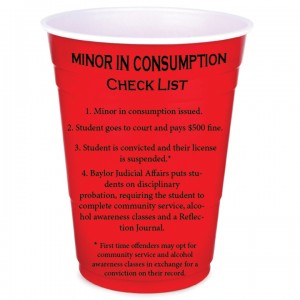
By Ada Zhang
Staff Writer
College is a time for new experiences. However, new experiences can also mean new mistakes.
With a never-before-had freedom, fun can quickly turn into foolishness—especially when alcohol is involved.
A Minor in Consumption (MIC) can be issued to anyone caught drinking under the legal age of 21. It is classified by Texas law as a Class C misdemeanor.
Baylor Police Chief Jim Doak said MICs are issued constantly throughout the school year. In some cases, students are arrested before school even begins.
“I can’t remember a year when we didn’t arrest a student during Welcome Week for consuming alcohol,” Doak said. “Freshmen experience a freedom they’ve never had before and they are not self disciplined.”
According to the Baylor Crime Log as of Aug. 23, there have not been any MICs during the month.
Doak said students are oftentimes seen staggering down the street, obviously intoxicated. The student’s behavior and appearance, such as slurred speech and bloodshot eyes, are clear indicators of inebriation.
“We try to get them off the street for their own safety,” Doak said. “We would rather them spend a night in the county jail than have them wander the streets.”
After an MIC is issued, the student is required to go to court.
Judge Walter H. Peterson, McLennan County justice of the peace, said students must pay a fine of up to $500.
Students can request a deferral if it is their first offense, meaning they can do community service and take an alcohol awareness class in exchange for the dismissal of a conviction from their record.
“I want to be clear that the arrest for consuming alcohol does not completely disappear from the record with a deferral,” Peterson said, “It just won’t show up as a conviction.”
Students who do not request a deferral are convicted and get their license suspended for 30 days.
On their second offense, students may still request a deferral or otherwise have their license suspended for 60 days with conviction.
If underage students are arrested a third time for consuming alcohol, they are convicted without a deferral option, and their license is suspended for 180 days.
In addition to paying the fine and complying to the court’s demands, charged students also have responsibilities with the university. Underage consumption violates the law, and it also violates the Student Conduct Code.
“While we think it might be our own business, it can become an issue for the university,” said Bethany McCraw, associate dean for student conduct administration. “It reflects on
Baylor—it reflects on all of us.”
The Baylor Police Department emails PDF police reports to Student Conduct whenever underage students are caught consuming alcohol either on or off campus.
Once Baylor officials are notified, the charged student will receive a charge notice through email from Baylor Judicial Affairs.
The charge notice will clearly state the misconduct with which the student is being charged.
Students have three business days to call Student Conduct to schedule a meeting with the associate dean.
The purpose of the meeting is to ensure that the student is indeed guilty.
“I listen to the student’s side of the story,” McCraw said. “I don’t want to punish someone for something they didn’t do.”
McCraw said there is not much of a dispute with MIC cases; students usually admit to their wrongdoing.
Students who admit to consuming alcohol are issued a disciplinary warning and placed on disciplinary probation for a calendar year.
Sanctions include taking an alcohol awareness course, completing community service and writing a reflection journal.
The court requires 12 community service hours while Student Conduct requires 20. As long as the service locations match, the hours can overlap. The same alcohol awareness course can count for both the court and Student Conduct.
The reflection journal’s purpose is to help students think critically about their actions. The journal also notifies Student Conduct of what additional guidance they can offer students.
The consequences for an MIC may seem severe, but they are meant to redirect students on a better path.
“If a student has a drinking problem, we want to help them,” McCraw said. “We want students to make good choices so they can be successful.”



